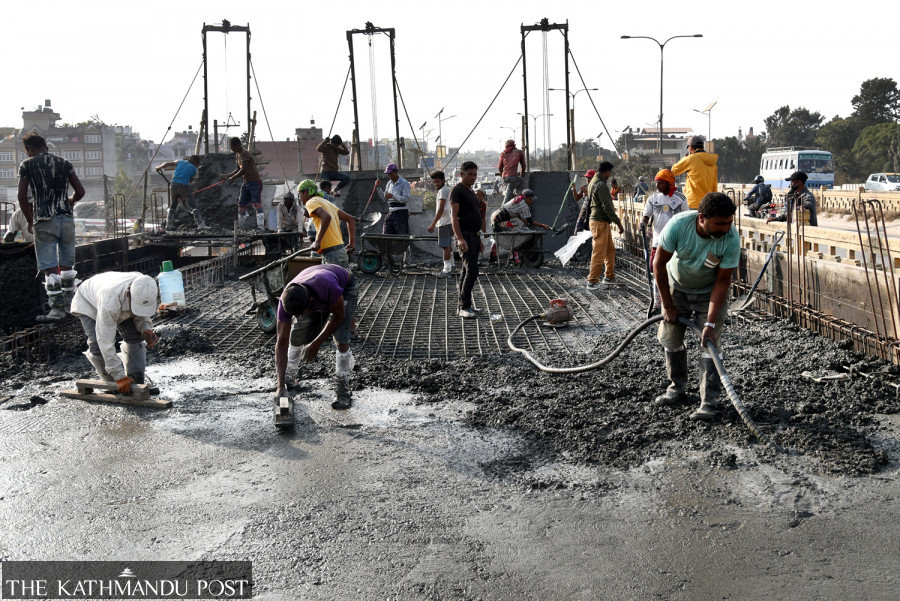National
New rule may prevent conflicts of interest in user groups
Elected officials, office-bearers of political parties and government staff, among others, may be denied seats on user committees for public projects.
Prithvi Man Shrestha
The Public Procurement Monitoring Office has proposed barring elected representatives, officer-bearers of political parties, employees of government entities, teachers, and contractors from participating in user committees formed to carry out public construction works.
The office has introduced such a provision in the proposed working procedures for the user committees in a bid to prevent conflict of interest while implementing public construction projects.
As per the proposed working procedures, a person who has not been convicted of a criminal offence, one who does not have any financial liability to the government, one who is not a member of another similar user committee, and a resident from the same locality as the project site can only become a member of the user committee.
Likewise, not more than one member of the same family can participate in a user committee, according to the proposed working procedure.
“User committees are being formed on the basis of power-sharing among political parties at the local level,” said Rajesh Kumar Thapa, director at the procurement monitoring office. “There have been many reports of political leaders and teachers participating in such committees.”
Thapa said that the new measures were proposed to prevent the conflict of interest arising from the involvement of political leaders and elected representatives, among others.
There have been many reports of user committees involving political party representatives being awarded construction projects. Also, construction projects hiring excavators owned by elected representatives has become common these days.
As per section 44 of the Public Procurement Act, if the economy, quality or sustainability is increased in having a construction work executed from the users’ committee or beneficiary community or if the main objective of the project is to generate employment and to have the beneficiary community involved, such a construction work may be executed by users' committee or beneficiary community.
As per rule 97 of the Public Procurement Regulations, any construction project with estimated cost of up to Rs10 million can be implemented through a user committee if the committee has only the local residents or project beneficiaries as its members.
But the trend of awarding projects to user committees has remained controversial as they are provided works without competition. Private sector contractors in particular have long been opposing this provision.
While carrying out construction work through contractors, the contracts are awarded through competitive bidding and this leads to reduced construction cost. But projects implemented through user committees or beneficiary communities are costlier because the project contracts are awarded through negotiations and work must be carried out manually without using any heavy machinery.
Rule 97 (9) of the Public Procurement Regulations bars user committees from using heavy machinery like loader, excavator, roller, dozer, grader bitumen distributor and bitumen boilers.
Rabi Singh, the president of the Federation of Contractors’ Association of Nepal, said the cost of a project could go up by threefold while carrying out the construction work through a user committee because everything has to be done manually without the use of heavy machinery.
“There is also the tendency of inflating the project cost on the pretext of not using heavy machinery when in fact they [user committees] have used heavy machinery,” said Singh. “Use of heavy machinery substantially reduces the cost and the user committee members have been pocketing the differential amounts.”
According to Singh, there is also a tendency of consumer committees colluding with certain contractors and subcontracting the project and making money out of the deal as use of machinery saves them huge sums.
For example, on August 26, the Commission for Investigation of Abuse of Authority filed a corruption case against the former chairperson and members of Shahid Laldhwaj Marga Upabhokta Samiti, which was tasked with the construction of a road connecting Kotre and Thaprek in Tanahun district.
Immediate past chairperson of the Samiti, Dilli Ram Adhikari, and other members—Mamita Gurung, Bhim Bahadur Gurung, Ganesh Kumar Gurung and a contractor named Binod Shrestha—were charged with corruption amounting to Rs776,700. As per the charge sheet, they had billed the Shuklaphanta Municipality for pebbles that they had obtained for free.
As per the revised new working procedure, at least 30 percent of the work of the projects implemented by consumer committees has to be labour intensive. Heavy equipment should not be used but if their use is essential, their share should not exceed 30 percent of the total project cost.
According to Thapa, this is the first time the government has sought to ensure the use of manual work in projects to be implemented by user committees.
According to him, there is also a growing tendency of fragmenting construction projects into smaller units because projects of over Rs10 million cannot be awarded to user committees. But despite these aberrations and concerns, the current government has increased the scope of works that the user committees can do.
The replacement bill on the budget ordinance, which was passed by the lower house on Monday and is currently in the upper house, has made provisions that workers can form a group or a cooperative and participate in competitive bidding for projects of up to Rs100 million.
“This opens the door for more irregularities in the name of workers’ groups or cooperatives,” said Singh.




 14.12°C Kathmandu
14.12°C Kathmandu














